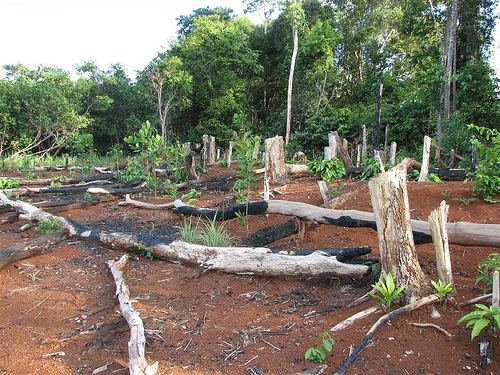Lao PDR and World Bank sign $42 deal to reduce emissions from deforestation
Under this Emission Reductions Payment Agreement (ERPA), the World Bank commits to making payments to the Lao PDR for verified reductions of up to 8.4 million tonnes of carbon dioxide emissions in northern Laos.

- Country:
- Lao PDR
The Lao PDR and the World Bank’s Forest Carbon Partnership Facility (FCPF) have signed an agreement to provide up to $42 million between now and 2025 to support the country’s efforts to reduce emissions from deforestation and forest degradation (REDD+). A ceremony today marked the launch of this forest- and climate-focused program.
Under this Emission Reductions Payment Agreement (ERPA), the World Bank commits to making payments to the Lao PDR for verified reductions of up to 8.4 million tonnes of carbon dioxide emissions in northern Laos. The program aims to address the drivers and underlying causes of forest loss in six provinces (Houaphanh, Luang Prabang, Oudomxay, Luang Namtha, Bokeo, Xayabouly), encompassing a third of the national territory. The region has been responsible for 40 percent of nationwide deforestation and forest degradation between 2005–15.
“We are committed to improving land use, strengthening forest protection, and enhancing forest restoration in line with the 2019 Forestry Law, the 9th National Socio-Economic Development Plan for 2021-2025, and the National Green Growth Strategy to 2030,” said Thongpath Vongmany, Vice Minister for Agriculture and Forestry. “This is an opportunity to drive economic growth and resilience with more sustainable rural land use based on participatory and integrated planning.”
The geography of northern Laos is distinct, with over 20 ethnic groups calling this mountainous region their home. Limited accessibility and infrastructure in these remote areas play a role in preserving cultural heritage, but also pose challenges for job opportunities, transportation, access to social services, and the promotion of industry and trade.
Working across sectors, the Lao emissions reduction program, entitled “Promoting REDD+ through Governance, Forest Landscapes and Livelihoods — Northern Laos”, supports better forest and land governance, land-use planning, livelihoods development, and sustainable ecosystem management to reduce pressure on forests. It also includes a benefit-sharing arrangement that will encourage communities and other stakeholders to participate.
“This innovative financing is part of World Bank support that helps the Lao PDR manage its landscapes for greener and more resilient economic growth and recovery,” said Nicola Pontara, World Bank Country Manager for Lao PDR. “This results-based funding will reduce emissions while benefiting people who depend on sustainable forests for their livelihoods.”
Lao PDR is the third country in Asia, after Indonesia and Vietnam, and the ninth country worldwide to sign an ERPA with the World Bank’s FCPF. The total value of these nine agreements, which have also been made with Chile, Costa Rica, Côte d’Ivoire, the Democratic Republic of Congo, Ghana and Mozambique, is nearly half a billion US dollars. Several other countries are expected to finalize their emission reductions programs and follow suit with ERPA signings early this year.
The Forest Carbon Partnership Facility is a global partnership of governments, businesses, civil society, and indigenous peoples' organizations focused on reducing emissions from deforestation and forest degradation, forest carbon stock conservation, sustainable management of forests, and the enhancement of forest carbon stocks in developing countries — activities commonly referred to as REDD+. Launched in 2008, the FCPF has worked with 47 developing countries across Africa, Asia, and Latin America and the Caribbean, along with 17 donors who have made contributions and commitments totalling $1.3 billion.
ALSO READ
World Bank Secures $700 Million for Pakistan's Economic Stability
World Bank Approves $50m Project to Accelerate Sri Lanka’s Digital Transformation
World Bank Boosts Pakistan's Economic Stability with $700 Million Initiative
World Bank Group Approves Innovative Financing to Strengthen Panama’s Economy
World Bank Approves $300m to Improve Gas Subsidy Targeting and Protect Families










